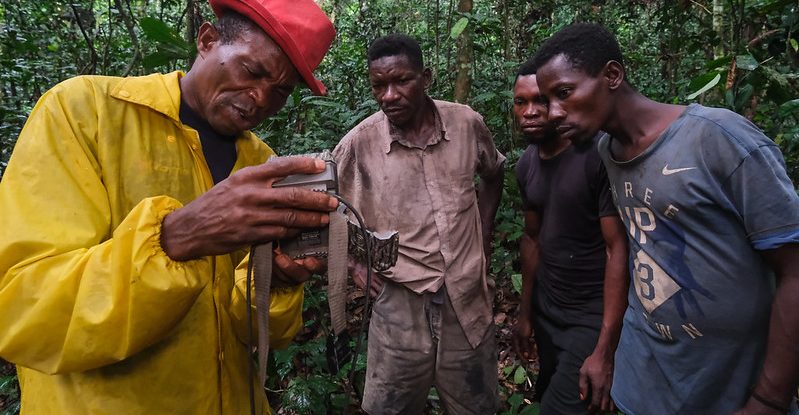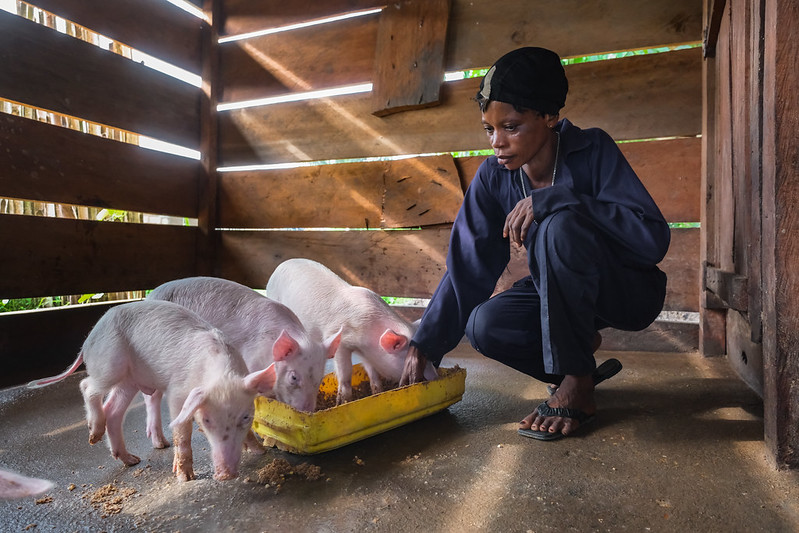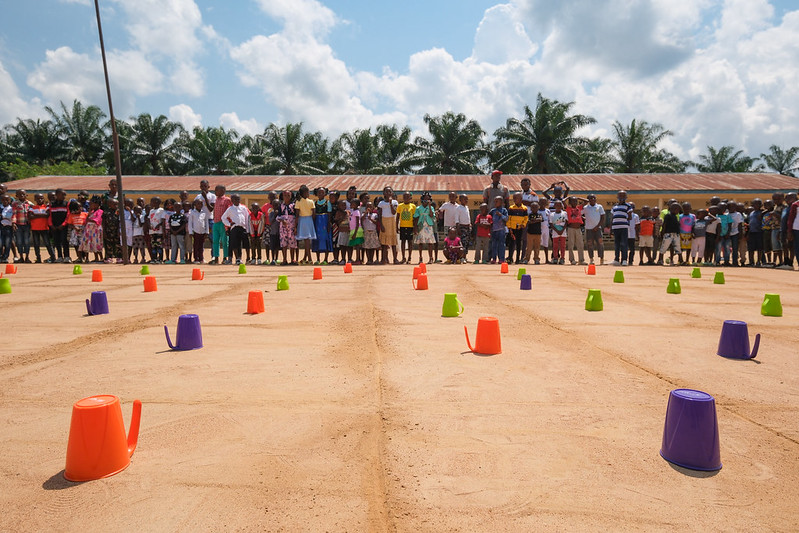
“When a hunter stands in front of a chimpanzee, he doesn’t feel like he has a choice,” says Kambale Nyumu Jonas, a conservation researcher and the co-founder of new grassroots NGO Solutions for Wildlife (SoWild).
“He sees income, and he doesn’t have other ways of getting income, so he thinks he has no option but to kill and sell it,” continues Kambale Nyumu. “And he knows that people in the market will readily buy it, too, because they don’t have alternatives either: bushmeat is the main source of protein in this landscape.”
Such decisions make many conservationists cringe. Chimpanzees [Pan troglodytes] are endangered, as are many of the other wild animals that hunters kill and sell here – pangolins [Pholidota spp.] and forest buffalo [Syncerus caffer nanus] among them. But as Kambale Nyumu explains, advocating for the importance of preserving these species is of little use if other livelihood and protein sources are not on the table.
What’s more, trying to protect them through legislation is ineffective in a landscape where law enforcement is weak and its agents often don’t have the knowledge and capacities to protect them from further exploitation.
It’s for these reasons that SoWild was formed in 2022, with support from Center for International Forestry Research and World Agroforestry (CIFOR-ICRAF) as part of its activities in the Yangambi Engagement Landscape. Funded by the European Union and United States Agency for International Development (USAID), it’s founded on the recognition that the long-term sustainability of conservation in the Yangambi Landscape hinges on strengthening the capacity of local civil society organizations that care for wildlife and people’s well-being.
The project seeks to reduce local communities’ dependency on wild meat through the development of alternative sustainable income-generating activities. “For instance, we’re helping communities to establish pig and chicken farming operations,” says Sagesse Nziavake.

Maman Hélène working in her piggery in Yangambi, Tshopo Province, DRC. Photo by Axel Fassio/CIFOR-ICRAF
She’s a researcher at CIFOR-ICRAF’s Kisangani office, which has been engaged in work within the Yangambi Landscape for 16 years and is currently supporting SoWild in its establishment process through building capacity and developing its website. “We’re also expanding to support [local community members] in breeding rabbits and guinea pigs, which have short gestation periods of around five weeks and give birth to litters of about seven young,” says Nziavake.
SoWild also seeks to support wild meat value chain stakeholders – namely, hunters and traders – to bring their activities to sustainable levels. One way of doing this, says Kambale Nyumu Jonas, is through the monitoring programme that it is running with local communities. Project staff work with community members to set up camera traps in their surrounding forests and show them how to identify the animals that appear in them and analyse the results.
“We use this process to explain, step by step, which species are abundant and which species are scarce,” says Kambale Nyumu. The programme also provide hunters with notebooks and prompts them to take note of which species they killed, how many, and how much money they made from doing so. “This helps them to understand more about what they are doing and what they are getting out of it, so that when we suggest measures to improve the sustainability of what they are doing, they can weigh them up more easily.”

Club Zamba (environmental group) activity in a school in Yangambi. Photo by Axel Fassio/CIFOR-ICRAF
The organisation is rolling out a range of environmental education interventions across the landscape targeted towards young people through club zamba ( group of secondary school children operating in weekends), including a radio programme and a theatre company that tours villages in the region telling stories about the importance of finding sustainable alternatives to the commercial bushmeat trade.
SoWild is also working carefully at the grassroots level to shore up the long term sustainability of its own activities. “In the Yangambi Landscape, there are many international partners, and very few that are local,” says Nziavake. “So we wanted to make sure that even if those international partners withdraw or run out of funding, SoWild can continue its efforts with local communities. Managing biodiversity is a long-term process, so local communities must have the capacity to take action – and to know how such action will benefit them, too.”
We want you to share Forests News content, which is licensed under Creative Commons Attribution-NonCommercial-ShareAlike 4.0 International (CC BY-NC-SA 4.0). This means you are free to redistribute our material for non-commercial purposes. All we ask is that you give Forests News appropriate credit and link to the original Forests News content, indicate if changes were made, and distribute your contributions under the same Creative Commons license. You must notify Forests News if you repost, reprint or reuse our materials by contacting forestsnews@cifor-icraf.org.